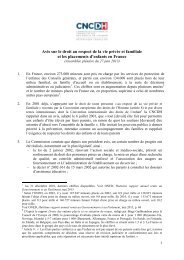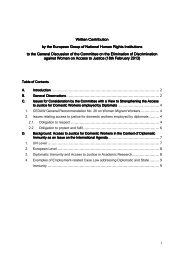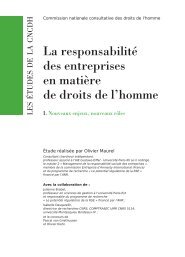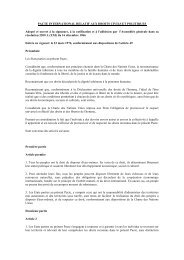Avis sur le projet de Traité sur le commerce des armes - CNCDH
Avis sur le projet de Traité sur le commerce des armes - CNCDH
Avis sur le projet de Traité sur le commerce des armes - CNCDH
Create successful ePaper yourself
Turn your PDF publications into a flip-book with our unique Google optimized e-Paper software.
avec <strong>le</strong> Par<strong>le</strong>ment à l’adoption d’un texte législatif <strong>sur</strong> <strong>le</strong> contrô<strong>le</strong> <strong>de</strong>s opérations <strong>de</strong> courtage ou<br />
d’intermédiation 9 .<br />
RÉGIME JURIDIQUE DU TRAITÉ<br />
Critères visés par <strong>le</strong> Traité et évaluation nationa<strong>le</strong> <strong>de</strong>s risques (artic<strong>le</strong>s 3, 4, 6.3, 6.4 et 6.5)<br />
17. La <strong>CNCDH</strong> a toujours conçu <strong>le</strong> <strong>projet</strong> <strong>de</strong> Traité comme un moyen non seu<strong>le</strong>ment <strong>de</strong> régu<strong>le</strong>r <strong>le</strong>s<br />
transferts d’<strong>armes</strong> mais éga<strong>le</strong>ment <strong>de</strong> <strong>le</strong>s « responsabiliser ». En ce sens, la « règ<strong>le</strong> d’or » défendue<br />
par <strong>le</strong>s ONG appartenant à la plate-forme française « Contrô<strong>le</strong>z <strong>le</strong>s <strong>armes</strong> » qui imposerait<br />
l’interdiction <strong>de</strong> tout transfert dès lors qu’il existerait un risque substantiel <strong>de</strong> violations graves <strong>de</strong>s<br />
droits <strong>de</strong> l’homme, du droit international humanitaire et d’entrave au développement socioéconomique<br />
a toujours été au cœur <strong>de</strong>s préoccupations <strong>de</strong> la <strong>CNCDH</strong>. Aussi, <strong>le</strong>s artic<strong>le</strong>s 3 et 4 du<br />
<strong>projet</strong> <strong>de</strong> Traité relatifs aux autorisations <strong>de</strong> transferts internationaux d’<strong>armes</strong> doivent faire l’objet<br />
d’une attention particulière.<br />
18. Le <strong>projet</strong> <strong>de</strong> Traité met en place un régime juridique à trois niveaux : 1) <strong>le</strong>s transferts qui ne<br />
doivent pas faire l’objet d’une autorisation ; 2) <strong>le</strong>s exportations qui font l’objet d’une autorisation<br />
après examen <strong>de</strong>s risques par rapport à certains critères et 3) <strong>le</strong>s exportations dont l’autorisation<br />
doit s’accompagner <strong>de</strong> me<strong>sur</strong>es « réalisab<strong>le</strong>s ».<br />
19. L’artic<strong>le</strong> 3 du <strong>projet</strong> <strong>de</strong> Traité mentionne <strong>le</strong>s cas <strong>de</strong> transferts qui sont interdits, correspondant à<br />
<strong>de</strong>s obligations contractées dans <strong>le</strong> cadre du Conseil <strong>de</strong> sécurité <strong>de</strong>s Nations unies ou d’accords<br />
internationaux. Dans ces cas, <strong>le</strong> transfert est simp<strong>le</strong>ment interdit, sans qu’il y ait besoin <strong>de</strong> recourir<br />
à une évaluation nationa<strong>le</strong>. Cependant, la <strong>CNCDH</strong> s’interroge <strong>sur</strong> <strong>le</strong> sens et <strong>le</strong>s implications <strong>de</strong><br />
l’artic<strong>le</strong> 3.3 qui prévoit l’interdiction <strong>de</strong> transfert qui « aurait pour but <strong>de</strong> faciliter » la commission<br />
d’un génoci<strong>de</strong>, <strong>de</strong> crimes contre l’humanité et <strong>de</strong> crimes <strong>de</strong> guerre. Outre <strong>le</strong> fait que cet artic<strong>le</strong> est<br />
inapplicab<strong>le</strong> - en raison <strong>de</strong> la difficulté <strong>de</strong> prouver l’intention <strong>de</strong> l’Etat exportateur - il ne<br />
correspond pas non plus aux principes existants du droit international selon <strong>le</strong>squels un Etat ne<br />
doit pas en ai<strong>de</strong>r un autre à commettre ou à faire perdurer un acte illicite aux termes du droit<br />
international 10 .<br />
20. L’artic<strong>le</strong> 4 porte <strong>sur</strong> <strong>le</strong>s exportations qui ne font pas l’objet d’une interdiction expresse mais qui<br />
doivent faire l’objet d’un processus d’évaluation nationa<strong>le</strong>. Au terme <strong>de</strong> cette évaluation, l’Etat<br />
déci<strong>de</strong> si l’exportation est autorisée ou refusée. Cet artic<strong>le</strong> constitue <strong>le</strong> cœur du traité.<br />
21. En vertu <strong>de</strong> la rédaction actuel<strong>le</strong> <strong>de</strong> l’artic<strong>le</strong> 4.1, l’Etat exportateur évalue si l’exportation<br />
envisagée « contribuerait ou porterait atteinte à la paix et à la sécurité ». Le sens <strong>de</strong> l’artic<strong>le</strong> 4.1 est<br />
sujet à diverses interprétations, dont certaines peuvent al<strong>le</strong>r à l’encontre <strong>de</strong> l’objet du traité. En<br />
effet, selon quel<strong>le</strong> gril<strong>le</strong> <strong>de</strong> <strong>le</strong>cture une exportation d’<strong>armes</strong> peut-el<strong>le</strong> être perçue comme<br />
contribuant ou portant atteinte à la paix et à la sécurité La <strong>CNCDH</strong> s’interroge <strong>sur</strong> l’opportunité<br />
d’un tel artic<strong>le</strong> en raison <strong>de</strong> son caractère vague et du potentiel d’abus qu’il renferme. La <strong>CNCDH</strong><br />
invite donc <strong>le</strong> Gouvernement à amener ses partenaires à modifier cet artic<strong>le</strong> <strong>de</strong> tel<strong>le</strong> sorte que si<br />
une exportation envisagée peut porter atteinte à la paix et à la sécurité, l'Etat exportateur refuse<br />
d'autoriser l'exportation, indépendamment <strong>de</strong> toute autre considération.<br />
9 Rapport annuel au Par<strong>le</strong>ment du ministère <strong>de</strong> la Défense <strong>sur</strong> <strong>le</strong>s exportations d’armement <strong>de</strong> la France,<br />
octobre 2012, p. 5 ; Voir éga<strong>le</strong>ment <strong>CNCDH</strong>, <strong>Avis</strong> <strong>sur</strong> l’interdiction <strong>de</strong>s opérations d’intermédiation sans<br />
autorisation, 8 février 2007.<br />
10 Selon <strong>le</strong>s principes généraux <strong>sur</strong> la responsabilité <strong>de</strong>s États, un État qui ai<strong>de</strong> ou assiste un autre État dans<br />
la commission d’un fait internationa<strong>le</strong>ment illicite, tel qu’une violation <strong>de</strong>s droits humains, par ce <strong>de</strong>rnier est<br />
internationa<strong>le</strong>ment responsab<strong>le</strong> pour avoir agi <strong>de</strong> la sorte lorsqu’il agit ainsi en connaissance <strong>de</strong>s<br />
circonstances du fait internationa<strong>le</strong>ment illicite – voir Responsabilité <strong>de</strong> l’État pour fait internationa<strong>le</strong>ment<br />
illicite, 2001, art. 4, reproduit dans <strong>le</strong> document <strong>de</strong>s Nations Unies A/RES/56/83, 28 janvier 2002.<br />
4







